Faculty
-

John Angus
Professor of Mathematics
Research Interests
Probability, Statistics, Computing, Algorithms, Navigation, Systems Engineering, Mathematical Finance
-

Samir Chatterjee
Fletcher Jones Chair of Technology Design & Management
Research Interests
Design science research, Health informatics, Electronics and telecommunication engineering
-

Wallace Chipidza
Associate Professor of Information Systems and Technology
Research Interests
Dynamics of social networks, Quantum Computing and Applications, Internet Privacy, ICT4D
-
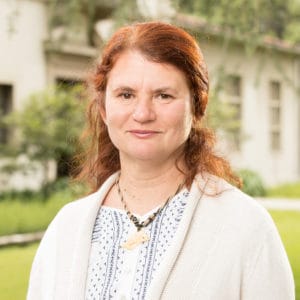
Marina Chugunova
Ellis Cumberbatch Professor of Mathematics
Program Director, PhD in Engineering & Computational MathematicsResearch Interests
Surfactant-driven thin film flows in biomedical applications; Nonlinear parabolic equations; Stability problems in fluid dynamics; Scientific computations; Applied operator theory; Sturm-Liouville problems
-
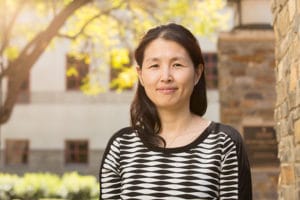
Yan Li
Associate Professor of Information Systems & Technology
Research Interests
Data science, Machine Learning, Natural Language Processing, Health Informatics, Mobile Health, Data Management, Data warehousing, Business intelligence, ICT4D
-

Hrushikesh Mhaskar
Distinguished Research Professor of Mathematics
Research Interests
Approximation theory, Computational harmonic analysis, Machine learning, Signal processing
-
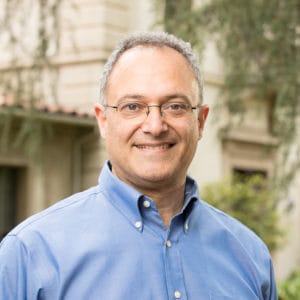
Ali Nadim
Professor of Mathematics
Research Interests
Fluid Dynamics, Mathematical Modeling, Scientific Computing
-

Andrew Nguyen
Adjunct Professor of Mathematics
Research Interests
Stochastic processes, Statistics, Risk management, Financial derivatives, Actuarial sciences, Statistical software
-
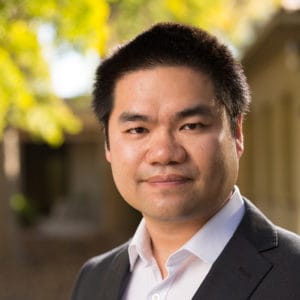
Qidi Peng
Research Associate Professor of Mathematics
Academic Director, Financial Engineering ProgramResearch Interests
Statistical inferences, Stochastic differential equations, Stochastic modeling, Simulation, Machine learning, Approximation theory, Graph theory
-

Allon Percus
Joseph H. Pengilly Professor of Mathematics
Director, Institute of Mathematical SciencesResearch Interests
Discrete optimization; Network models; Statistical physics; Random combinatorial structures
-
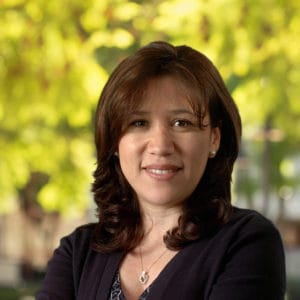
Claudia Rangel-Escareño
Adjunct Professor of Mathematics
Research Interests
Probabilistic methods in computational biology, Statistical inference of genetic networks, Bioinformatics
-

Henry Schellhorn
Professor of Mathematics
Research Interests
Financial engineering, Credit risk, Stochastic analysis, Traffic models
-

Chinazunwa Uwaoma
Research Assistant Professor of Information Systems & Technology
Research Interests
Internet of Things, Mobile Computing, Computer Communications & Networks, Healthcare Systems, Artificial Intelligence, and Cyber Security
Extended Faculty
-
Konrad Aguilar
Pomona College
Research Interests
Noncommutative/quantum metric geometry, functional analysis, operator algebras
-
Arthur Benjamin
Harvey Mudd College
Research Interests
Combinatorics, game theory, operations research
-
Andrew Bernoff
Harvey Mudd College
Research Interests
Applied dynamical systems, fluid mechanics, self-similarity and scaling
-
Sarah Cannon
Claremont McKenna College
Research Interests
Randomized algorithms, Markov chains, stochastic processes, discrete geometry, statistical physics
-
Alfonso Castro
Harvey Mudd College
Research Interests
Partial differential equations, variational methods, inverse-function theorems, water waves (solitons)
-
Lisette G. de Pillis
Harvey Mudd College
Research Interests
Computational fluid dynamics, numerical linear algebra, mathematical biology
-
Vin de Silva
Pomona College
Research Interests
Computational topology, manifold learning
-
Christina Edholm
Scripps College
Research Interests
Mathematical biology, epidemiological modeling
-
Lenny Fukshansky
Claremont McKenna College
Research Interests
Number theory, discrete geometry
-
Stephan Garcia
Pomona College
Research Interests
Complex symmetric operators, operator theory, complex function theory
-
Edray Goins
Pomona College
Research Interests
Algebraic geometry, number theory, representation theory
-
Weiqing Gu
Harvey Mudd College
Research Interests
Differential geometry, Grassman manifolds
-
Jamie Haddock
Harvey Mudd College
Research Interests
Mathematical data science, optimization, applied convex geometry
-
Johanna Hardin
Pomona College
Research Interests
Model-based clustering, outlier detection, robust clustering, analysis of microarray data
-
Mike Izbicki
Claremont McKenna College
Research Interests
Machine learning, high-dimensional probability, computational geometry
-
Jon Jacobsen
Harvey Mudd College
Research Interests
Nonlinear elliptic partial differential equations, fluid dynamics
-
Chiu-Yen Kao
Claremont McKenna College
Research Interests
Numerical analysis and scientific computing
-
Gizem Karaali
Pomona College
Research Interests
Lie & Hopf algebras, quantum groups, Poisson-Lie structures, combinatorial representation theory
-
Ran Libeskind-Hadas
Claremont McKenna College
Research Interests
Computational biology, cophylogenetics, design and analysis of algorithms
-
Haydee Lindo
Harvey Mudd College
Research Interests
Commutative algebra, homological algebra, representation theory
-
Susan Martonosi
Harvey Mudd College
Research Interests
Operations research, applied probability, aviation security
-
Sam Nelson
Claremont McKenna College
Research Interests
Algebraic topology, knot theory
-
Mohamed Omar
Harvey Mudd College
Research Interests
Combinatorial optimization, graph theory, algebraic geometry
-
Mike O’Neill
Claremont McKenna College
Research Interests
Complex analysis and harmonic analysis
-
Michael Orrison
Harvey Mudd College
Research Interests
Harmonic analysis on finite groups, algebraic voting theory
-
Jeho Park
Claremont McKenna College
Research Interests
High-performance computing, data science
-
Ami Radunskaya
Pomona College
Research Interests
Dynamical Systems, stochastic processes, applications of dynamical systems to instrument modeling, sound generation, and interactive composition
-
Animesh Ray
Keck Graduate Institute
Research Interests
Genomics, computational and systems biology
-
Adolfo Rumbos
Pomona College
Research Interests
Nonlinear analysis, differential equations
-
Ghassan Sarkis
Pomona College
Research Interests
Number theory and commutative algebra, p-adic formal group
-
Shahriar Shahriari
Pomona College
Research Interests
Combinatorics, representation theory of finite groups
-
James Sterling
Keck Graduate Institute
Research Interests
Bioengineering, microfluidics
-
Francis Su
Harvey Mudd College
Research Interests
Geometric and topological combinatorics, game theory, mathematical economics
-
Chris Towse
Scripps College
Research Interests
Arithmetic geometry, algebraic number theory, combinatorics
-
Talithia Williams
Harvey Mudd College
Research Interests
Spatial-temporal modeling of rainfall data
-
Helen Wong
Claremont McKenna College
Research Interests
Low-dimensional topology, applications to molecular biology, data analysis, and quantum computation
-
Darryl Yong
Harvey Mudd College
Research Interests
Mathematics education, applied mathematics, perturbation theory, partial differential equations
-
Heather Zinn Brooks
Harvey Mudd College
Research Interests
Applied mathematics, mathematical modeling, complex systems, nonlinear dynamics, network theory, social systems, mathematical biology
Curriculum
General doctoral degree requirements at CGU may be found in the Doctoral Degree Regulations section of the CGU Bulletin.
Course requirements. 72 units of coursework are required to complete the doctoral degree. These units must include 4 units of transdisciplinary course(s), per university policy.
- 24 units of Mathematics coursework taken at IMS. These include one course each, from at least three of the following four categories.
- Mathematical Modeling
Math 387 Discrete Mathematical Modeling
Math 388 Continuous Mathematical Modeling - Advanced Statistics with Computation
Math 351 Time Series Data Analysis
Math 352 Nonparametric Statistics
Math 353 Asymptotic Methods in Statistics
Math 355 Linear Statistical Models - Advanced Numerical Analysis
Math 362 Numerical Methods for Differential Equations
Math 368 Advanced Matrix Analysis and Computations - Exotic Algorithms
Math 293/393 Clinic
Math 306 Optimization
Math 364 Machine Learning for Asset Pricing
Math 375 Quantum Computing and Applications
Math 454 Statistical Learning
Math 462 Mathematics of Machine Learning
- Mathematical Modeling
All other courses needed to satisfy the 24-unit mathematics requirement are electives, chosen in consultation with the student’s PhD advisor.
- 24 units of coursework in computational science applications. These may be chosen from the following options.
- IST 302 Databases
- IST 332 Natural Language Processing
- IST 340 Knowledge Discovery and Data Mining
- IST 341 CS Insights via Python
- IST 342 Managing Data at Scale
- IST 343 Data Science Practicum
- IST 344 Data Analytics and Visualization
- IST 345 Generative Deep Learning
- IST 346 Data Warehousing and Business Intelligence
- Math 259 Methods of Applied Probability and Statistics
- Math 264 Scientific Computing
- Math 265 Numerical Analysis
- Math 294 Methods of Applied Mathematics
- Math 359 Computational Statistics
- Math 386 Image Processing
- Up to 2 elective courses offered by a different department at CGU or at the Claremont Colleges, approved by the student’s PhD advisor and in an area related to the student’s dissertation research.
- 24 units of research or approved transfer coursework from a previous master’s degree. In the case of a master’s degree at CGU (particularly the MS in Computational and Applied Mathematics), up to 32 units of approved coursework may be applied to the PhD in Computational Science.
- The 4-unit transdisciplinary requirement may be taken in place of any of the requirements above, provided that three of the four core Mathematics categories are still covered.
Residency. Students must fulfill the CGU residency requirement: at least two semesters of full-time study within a two-year period or 48 units within a three-year period. It is recommended that coursework be completed on a full-time basis; while part-time attendance is an option, degree requirements should be fulfilled within a seven-year time frame.
Satisfactory Academic Progress. The University’s policy on satisfactory academic progress applies. Students who do not maintain a minimum overall grade point average of 3.0 are placed on academic probation. Students who remain on academic probation after taking an additional 8 units of coursework may be dismissed from the program.
Advising. Upon admission to the program, students are normally assigned a PhD research advisor, who may be from a collaborating institution. While PhD advisors do not need to have an academic appointment, they must themselves have a PhD.
Qualifying Examination. Students are normally required to pass an oral qualifying examination by the time of completing 48 units of coursework. The qualifying examination consists of a term research project supervised by the student’s PhD advisor. The student selects a PhD committee consisting of at least three faculty members, normally chaired by the advisor, with at least one member being from IMS and at least one member being from CISAT. The student prepares a written account of research work performed and its results, and then presents the work orally to the members of the PhD committee. Should a student fail the qualifying exam, one retake will be allowed.
Research Tools. The following two research tools, intended to help prepare students for independent research, are required:
- Publication requirement. The student must demonstrate research competency by being the principal author of at least one scientific paper submitted to a peer-reviewed journal or peer-reviewed conference.
- Professional experience requirement. The student must demonstrate professional aptitude in one of the following ways.
- Internship: work experience for a period of no less than 8 weeks and no more than 4 years.
- Presentation: poster or talk at a conference.
- Equivalent experience at the advisor’s discretion.
Dissertation Proposal. This takes the form of a scientific grant proposal to a major funding agency, describing the research project on which the dissertation is based. The student prepares a public oral presentation of the proposal, followed by a private examination by the PhD committee. Upon successful completion of this presentation, the student will be recommended for advancement to candidacy for the PhD degree.
Dissertation Completion and Final Oral Examination. On completion of the research, the student prepares the dissertation in accordance with CGU regulations. The student presents the work in public and defends it at a final oral examination by the PhD committee.
Application Guidelines
| University Requirements | |
|---|---|
| Application Fee | $80 (fee is non-refundable) |
| Official Transcripts | Undergraduate/graduate |
| English Proficiency Exam | Required (international applicants only) |
| Resume | Applicants must submit an up-to-date copy of their resume. |
| Program Requirements | |
|---|---|
| Statement of Purpose | Please submit a 2-3 page statement of purpose that details your academic and/or professional achievements, your specific areas of research interest within your desired field of study, why you are a strong candidate for graduate studies at CGU, and your career goals. |
| Letter of Recommendation | 2 letters required |
Key Dates & Deadlines
CGU operates on a priority deadline cycle. Applicants are strongly encouraged to submit complete applications by the priority dates in order to assure maximum consideration for both admission and fellowships.
Once the priority deadlines have passed, the University will continue to review applications for qualified candidates on a competitive, space-available basis. The final deadlines listed are the last date the University can accept an application in order to allow sufficient time to complete the admissions, financial aid, and other enrollment processes.
Spring 2025
Priority Deadline – November 1, 2024
Final Deadline (International) – November 15, 2024
Final Deadline (Domestic) – December 1, 2024
Classes begin – January 21, 2025
Fall 2025
Priority Deadline – February 1, 2025
Final Deadline (International) – July 5, 2025
Final Deadline (Domestic) – August 1, 2025
Classes begin – August 25, 2025
Cost & Aid
ESTIMATED TUITION (CALIFORNIA RESIDENTS, NON-RESIDENTS, INTERNATIONAL)
| Program | 72 units |
| Tuition per unit* | $2,020 |
*Based on 2024-2025 tuition rates.
STUDENT FEES (PER SEMESTER)
| $245 Student Fee |
| $150 Technology Fee |
| International Student Services Fee*: $661 fall semester, $776 spring semester **Applies to all international students (F-1 visa only) who are registered in coursework, doctoral study, or continuous registration. The fee is assessed each fall and spring semester for annual ISO accident and sickness plans and administrative fees. Subject to change. |
For estimates of room & board, books, etc., please download CGU’s Cost of Attendance 2024-2025.